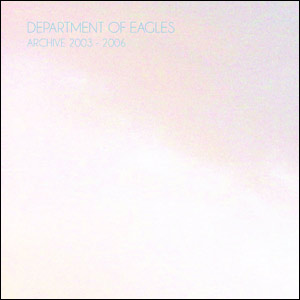
Archive 2003–2006
American Dust
Archive 2003–2006 shouldn’t be taken as an album. Rather, it’s a collection of artifacts, a curio cabinet, if you will, of the origins of Daniel Rossen’s twin outlets of expression. Grizzly Bear and Department of Eagles are both hailed for their compositional complexity and lyrical elusiveness, thus the true fanatics (and they are out there—I’ve met some) will rejoice to find an entire 11 tracks of exactly the kind of mysteries that might help them to piece together the influences and parse the various talents of the collaborations. Archive documents Rossen and fellow Eagle Fred Nicolaus’ musical minds during the years before and just after Rossen joined the Grizzly collective.
I haven’t yet been able to dig out any one moment and pin it to its evolved form on either band’s records. Certainly, though, something like “While We’re Young” or “Grand Army Plaza” would fit right in on In Ear Park or Yellow House, despite being slightly less refined and not as well documented. Perhaps more interesting, though, will be the songs that would not fit in so well. “Flip” is too raw and unrestrained to belong to Rossen’s recent oeuvre, and “Deadly Discolsure” too direct. Still, the songwriting is highly developed and it’s certainly exciting (relatively speaking, it’s still a Department of Eagles record after all) to hear what happens when these guys loosen the reins a bit. For my money, “Brightest Minds” is the most successful complete song on the disk, despite that it’s probably a little too twangy and chaotic for Rossen and comapny’s current methods.
Nearly half the tracks are officially titled as “Practice Room Sketch” (numbers 1 through 5), again reflecting the release’s anthropological intent. Even in those bits, though, you can hear Rossen discovering the elevated textures and that particular lilt that is unique to his work. Potent ideas like the “when is it going to get easier” refrain of #3 and the deeply submerged instruments of #1 make you sit up and take notice, even though the moments are fleeting. Or, at the opposite extreme, is “Golden Apple,” nearly five minutes of slow build to a deeply layered climax show that the duo had grand ambitions, even when they hadn’t yet the means.
Matt Slaybaugh
PAST PERFECTS
Concrete Blonde, Bloodletting
The Undertones
Oasis, Time Flies 1994-2009
The Cure, Disintegration
Shoes, Eccentric Breaks and Beats
Refused, The Shape of Punk to Come
The Jon Spencer Blues Explosion, Now I Got Worry and Controversial Negro
The Moles, Untune the Sky
Jeff Eubank, A Street Called Straight
Tommy James & the Shondells
Destroyer, City of Daughters, Thief, and Streethawk: A Seduction
Big Audio Dynamite, This Is Big Audio Dynamite
Elliott Smith, Roman Candle and From a Basement on the Hill
Nick Cave and the Bad Seeds Reissues Part Two
